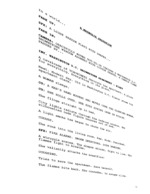Indie Filmmakers Look for Lifeline from Piracy with CASE Act

This is a typical indie-filmmaker piracy story.
Indie filmmakers Jane Clark and Bob Tourtellotte, owners of FilmMcQueen Productions, recount their horror story of piracy on “Crazy Bitches” (2014) in this Variety article.
Independent filmmakers make a low-budget movie only to be raped by pirates.
As much as indie filmmakers try, without the deep pockets and corporate studio team work of shutting-down these pirate sites, there is just about no way to win the war of piracy. I really feel for the filmmakers as I have had several filmmaking friends experience just the same, yet they never had resources to fight the piracy.
The CASE Act
The CASE Act is bad law to begin with. It is clear the trial lawyers’ lobby is involved behind-the-scenes, because of the limit of $30,000 in damages, which is non-contestable after-hearing at an administrative board. That ain’t even a reals court. Just a desk, a few chairs, and some lacky lawyer who calls themselves The Judge. Oh, except in class action lawsuits, the rules change. Funny, isn’t it?
Here is what the CASE Act is supposed to do:
- This bill creates the Copyright Claims Board, a body within the U.S. Copyright Office, to decide copyright disputes. Damages awarded by the board are capped at $30,000.
- Participation in board proceedings is voluntary with an opt-out procedure for defendants, and parties may choose instead to have a dispute heard in court. If the parties agree to have their dispute heard by the board, they shall forego the right to be heard before a court and the right to a jury trial. Board proceedings shall have no effect on class actions.
- The board shall be authorized to hear copyright infringement claims, actions for a declaration of noninfringement, claims that a party knowingly sent false takedown notices, and related counterclaims.
- The bill provides for various procedures, including with respect to requests for information from the other party and requests for the board to reconsider a decision.
- The board may issue monetary awards based on actual or statutory damages.
- The parties shall bear their own attorneys’ fees and costs except where there is bad faith misconduct.
- A board’s final determination precludes relitigating the claims in court or at the board. Parties may challenge a board decision in federal district court only if (1) the decision was a result of fraud, corruption, or other misconduct; (2) the board exceeded its authority or failed to render a final determination; or (3) in a default ruling or failure to prosecute, the default or failure was excusable.
I doubt this law will ever make it out of the Senate where it sits as of this date. America is a dumpster fire right now and Congress set it.
The sad thing I do know from my 37-years in this industry are the No. 1 pirates of movies, wait for it… live and work in Hollywood. Yep. I have seen pirates all my career. They feel entitled because they did not create the work which they pirated. They feel entitled because they “work” in the industry. They have a “backstage pass.”
I know friends of mine, who do not work in the industry, who pirate content. And, see no issue with stealing from filmmakers.
I know friends of mine, who work in the industry, who pirate content. And, see no issue with stealing from filmmakers.
The No. 1 excuse, which is never told to me directly, is, “F! the man in Hollywood.” Or, some words to that effect.
Until there is a death penalty attached to piracy, such as these filmmakers have experienced, this CASE Act won’t do much, if anything.
– Stan
More reading at: Variety: The CASE Act Will Empower Creatives to Fight the Horrors of Piracy


!["Crazy Bitches" (2014) [Courtesy Crazy Bitches]](https://stanleybgill.com/21/08/wp-content/uploads/2020/04/crazy-bitches-2014-150x150-1.jpg)






